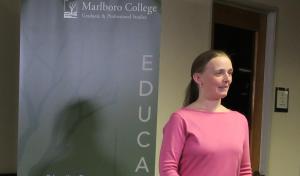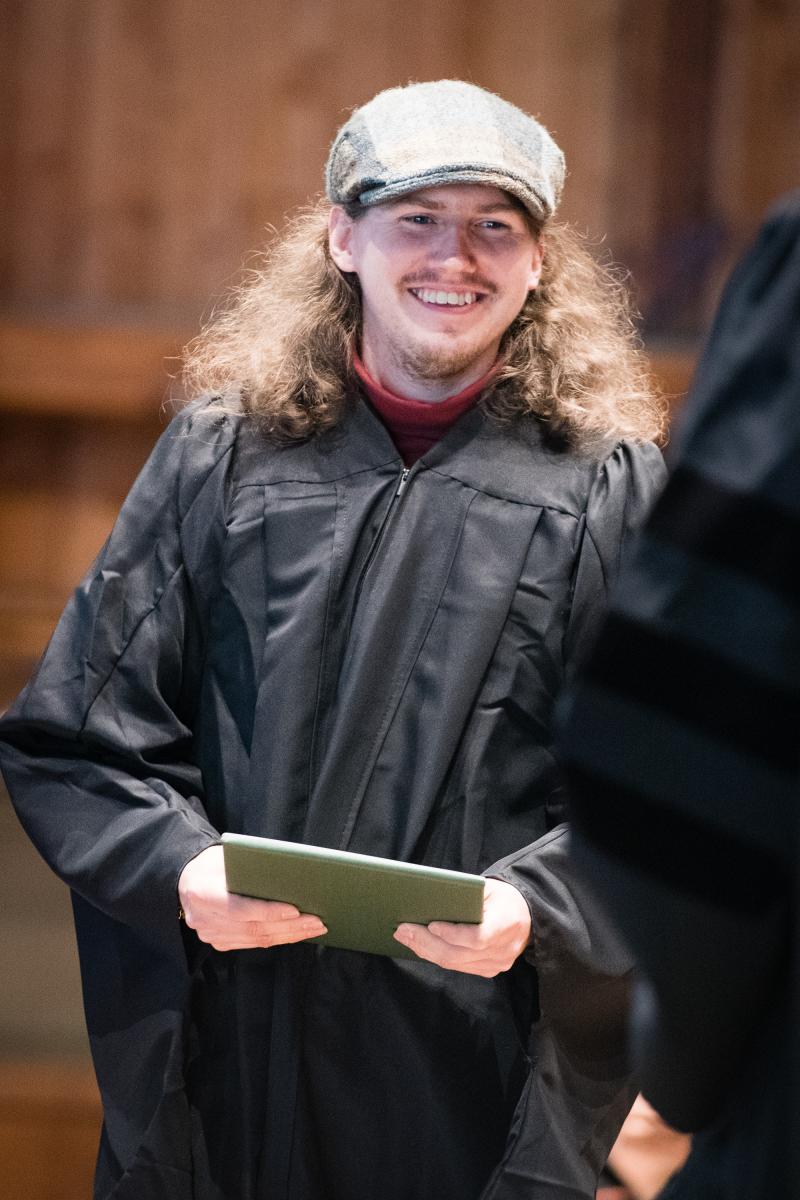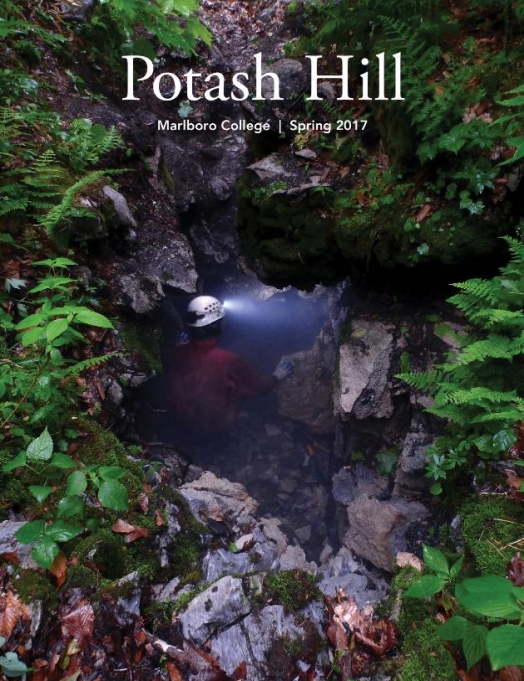“My first residency weekend had me experiencing deja vu,” said Heidi Doyle ’94 MAT ’16 in her student address at commencement last May, referring to her experience in the graduate program. “The discussions that took place, the rigor of the work, and the self-pacing that was required seemed strangely familiar. . . I was beginning to have a sneaking suspicion that the undergraduate and the graduate campuses valued the same things.”
Heidi was the first “dual” alumnus to address the first-ever combined undergraduate-graduate commencement (Potash Hill, Fall 2016), and she gave a fitting tribute to what is a growing phenomenon. Marlboro students are finding valuable continuities and rewarding careers by following their undergraduate degree with one of the college’s graduate programs.
“Nearly 30 students, with several more on the way, have completed both their bachelor’s and master’s degrees at Marlboro, bringing theory into practice through a graduate program in teaching or management,” says Kate Jellema, associate dean for graduate and professional studies. “We have much to learn from these ‘bi-lumni,’ and their positive stories are even more poignant as we move the graduate program to Potash Hill this year."
“The two programs have so much in common: extraordinary faculty, small classes, emphasis on community, and the opportunity for each student to study and pursue what he or she is most passionate about,” says Sarah Swift ’04, who completed her Capstone for an MS in Management in December. Sarah’s Plan in sociology and photography focused on the social and psychological aspects of dying and grieving, including making photographic quilts with people facing end-of-life issues. For her Capstone she established a nonprofit called Sewing Our Stories.
 “I felt drawn to figuring out how to develop a nonprofit that could use traditional crafts, such as the photographic quilting I’d done for my Plan, with people at the end of life as a way to honor and affirm their lives,” says Sarah, who works at a hospice council in Augusta, Maine. “In a way, my graduate Capstone felt like an extension of my Plan— with the support of my coursework and faculty adviser, I was able to develop and launch this nonprofit project.”
“I felt drawn to figuring out how to develop a nonprofit that could use traditional crafts, such as the photographic quilting I’d done for my Plan, with people at the end of life as a way to honor and affirm their lives,” says Sarah, who works at a hospice council in Augusta, Maine. “In a way, my graduate Capstone felt like an extension of my Plan— with the support of my coursework and faculty adviser, I was able to develop and launch this nonprofit project.”
Adam Katrick ’07 did his Plan in biology and writing, specifically wolf biology, and last fall completed his MS in Management with a concentration in nonprofit management. In the process he has started his own nonprofit to teach people in the region about wolves, called Wolfgard Northeast, and is embarking on a campaign to build a wolf center in Southern Vermont.
“We’ve got a really dynamic, energized board of directors, a number of dedicated supporters, and have run programs from New York City to Burlington and many places in between,” says Adam, who lives in Marlboro. “Every week I get the opportunity to teach people about wolves. I’m more immersed in my relationship with the wilderness and wolves than ever before. It’s such a joy to see people’s faces when I tell them we’re building a wolf center—there’s so much excitement there.”
“I found that having gone through the Plan process made the Capstone project at the end of my graduate program far less intimidating,” says Francisco Mugnani ’10 MAT ’14. Francisco’s Plan in film/video studies focused on examining patterns in the narrative structure of hero myths, and his Capstone involved creating an online course to learn video production. “In both projects I worked one-on-one with a professor, set goals, and worked toward a project that exhibited my learning. The Capstone was different, however, in that the focus was more on applying my learning to help another person or organization.”
 Francisco has gone on to work as a media producer and teacher, giving film instruction and helping out with several independent video projects, most often in schools. He is currently working at the Brooks Memorial Library in Brattleboro. “I delight in helping kids find their books and in witnessing firsthand how the library is working to evolve with emerging technologies and new ideas about how people learn,” he says.
Francisco has gone on to work as a media producer and teacher, giving film instruction and helping out with several independent video projects, most often in schools. He is currently working at the Brooks Memorial Library in Brattleboro. “I delight in helping kids find their books and in witnessing firsthand how the library is working to evolve with emerging technologies and new ideas about how people learn,” he says.
Geordie Morse ’13 MATESOL ’16 did his Plan on Asian studies and education, specifically on issues concerning the contemporary Japanese education system, such as how history textbooks influenced, and were influenced by, modern politics and culture. After graduating from Marlboro he spent a year gaining valuable firsthand experience as an English teacher in Japan, then returned to get his MA in TESOL.
“I wanted to continue my studies in an institution that shared Marlboro’s ideals and ethics of education,” says Geordie. “I was looking for small class sizes and a program that made my contributions feel worthwhile. What stands out to me about the graduate program is how dedicated and passionate the professors are about the mission of their programs, and how much care and attention they are willing to give their students to help them succeed.”
“My favorite thing about the graduate program was the conversations during the face-to-face weekends,” says Heidi Doyle, who is now a library media and technology integration specialist at Sunapee Central Elementary School in New Hampshire. “Because all of my classmates came from such diverse backgrounds, they brought a unique perspective to the conversation. We were all trying to accomplish the same goals, but our purpose and intent for those goals were vastly different.”
Like many “bi-lumni,” Heidi found similarities between her undergraduate and graduate experiences, including the rigor of work, the quality of discussion, and a certain “quirkiness.” “Small class sizes and intimate relationships with classmates and professors is prevalent in both programs. Those relationships enrich both your professional and personal life and provide a safe environment for taking risks.”
Or in Francisco’s apt words, “If you think of Marlboro undergrad as a movie, the Marlboro graduate program is like a great sequel. It preserves many of the core elements that made the original successful, but expands it in a bold new direction.”
Although not technically a dual alumnus, Ahmed Salama drives home the idea that there is something synergistic in Marlboro’s undergraduate and graduate programs. A native of Egypt, Ahmed taught Arabic to undergraduate students as Marlboro’s Fulbright Fellow for Arabic Language in the 2008–2009 academic year. After working for several years as head of the foreign languages department at Learning Services and Solutions Center in El Mahalla El Kubra, Egypt, Ahmed was back at Marlboro last summer, participating in the MA in TESOL program.

